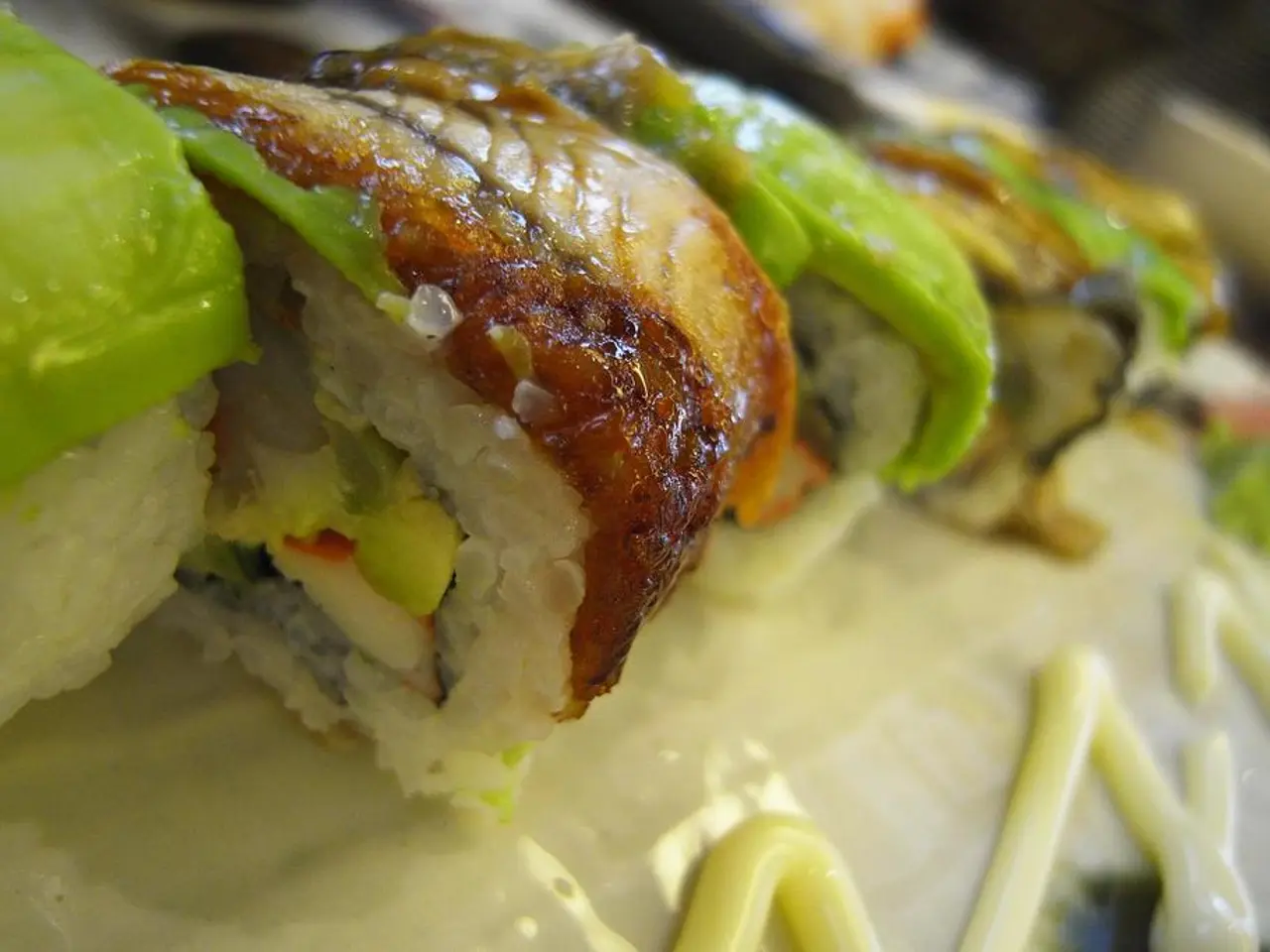Dietary Guidelines for Kidney Cancer: Edible and Prohibited Foods
====================================================
Living with kidney cancer can be challenging, and maintaining a balanced diet is an essential part of managing the condition. Here are some key recommendations to support kidney function, manage symptoms, and maintain overall nutrition.
Foods to Include
A diet for kidney cancer patients should focus on low to moderate protein intake, around 0.6-0.8 g/kg body weight, to avoid overburdening the kidneys. High-quality proteins, such as egg whites, are preferable as they provide essential amino acids with lower phosphorus content.
Fruits and vegetables that are kidney-friendly, such as cabbage, bell peppers, blueberries, cranberries, apples, arugula, and olive oil, should be included in the diet. These foods contain antioxidants and anti-inflammatory compounds beneficial for kidney health.
Healthy fats from sources like olive oil promote heart and kidney health due to anti-inflammatory monounsaturated fats. Moderate calcium intake is also important to avoid kidney stone formation, while limiting high-oxalate foods helps reduce the risk of stone formation.
Foods to Avoid or Limit
High-phosphorus foods, such as seafood, dairy products, nuts, organ meats, pumpkin/sunflower seeds, whole grains, lentils, beans, quinoa, soy, and amaranth, should be limited because phosphorus can accumulate in kidney impairment and worsen kidney disease.
High-sodium foods like packaged, processed, and fast foods should be avoided to prevent fluid overload and hypertension. High-protein diets should be avoided unless on dialysis, as excess protein enhances kidney workload. Oxalate-rich foods, such as nuts, soy products, spinach, sweet potatoes, and certain legumes, should be reduced to lower the risk of kidney stones.
Role of a Dietitian
A dietitian plays a crucial role in managing the complex nutritional needs of kidney cancer patients. They can customize the diet based on the patient’s stage of kidney cancer, treatment type, kidney function, and nutritional status. Dietitians help balance protein needs to maintain muscle and tissue repair without overloading kidney function.
They guide food choices to manage side effects of treatment (e.g., nausea, appetite loss) and maintain adequate calorie and nutrient intake. Dietitians monitor and adjust intake of minerals like phosphorus, potassium, calcium, and sodium to minimize further kidney damage and complications. They provide education on how to read food labels, prepare kidney-friendly meals, and recommend suitable supplements if necessary.
Additional Tips
It is important to avoid alcohol and sugar-sweetened drinks, such as soda and energy drinks, as they may strain the kidneys. Avoiding sugary, greasy, spicy, or fried foods can help manage diarrhea during kidney cancer treatment.
A person may choose to avoid foods high in salt after receiving a kidney cancer diagnosis, such as cured and canned meat, poultry, and fish, salted popcorn, potato chips, and pretzels. The American Institute for Cancer Research recommends people avoid or limit eating red and processed meats, sugar-sweetened drinks, and highly processed foods.
Eating foods that are low in fiber can help manage diarrhea during kidney cancer treatment. Consuming foods and drinks that are high in sodium and potassium can also help manage diarrhea. Avoiding foods and drinks that can cause gas, as well as alcohol and caffeinated beverages, can further help manage diarrhea.
Cancer Research UK suggests a link between kidney cancer and a diet high in protein, and a person may therefore choose to consume a diet low in protein. A dietitian can help people with kidney cancer plan their diet and create a suitable eating plan with foods to eat and avoid.
The American Cancer Society recommends including whole fruits in a variety of colors as part of a healthful diet, with whole fruits providing more benefits than drinking fruit juice. Eating small snacks at bedtime can help manage appetite loss during kidney cancer treatment.
It is best for a person to discuss protein intake with a doctor if they receive dialysis for kidney cancer. Eating smaller meals more frequently can also help manage appetite loss.
[1] Kidney Cancer UK. (2021). Diet and nutrition. Retrieved from https://www.kidneycanceruk.org/information-and-support/living-with-kidney-cancer/diet-and-nutrition
[2] American Cancer Society. (2021). Diet and cancer prevention. Retrieved from https://www.cancer.org/cancer/cancer-causes/diet-physical-activity/diet.html
[3] American Institute for Cancer Research. (2021). Diet and cancer prevention. Retrieved from https://www.aicr.org/diet-and-cancer/diet-and-cancer-research/diet-and-cancer-prevention.html
[4] Canadian Cancer Society. (2021). Diet during cancer treatment. Retrieved from https://www.cancer.ca/en/cancer-information/cancer-type/kidney-cancer/managing-side-effects/diet/pages/diet.aspx
[5] National Kidney Foundation. (2021). Kidney-friendly meal planning. Retrieved from https://www.kidney.org/atoz/content/kidneyfriendlymealplanning
- A dietitian can customize a diet plan for a kidney cancer patient, considering factors like the stage of the disease, treatment type, kidney function, and nutritional status.
- Some foods to include in a diet for kidney cancer patients are fruits and vegetables such as cabbage, bell peppers, blueberries, cranberries, apples, arugula, and olive oil due to their antioxidant and anti-inflammatory properties.
- Foods high in phosphorus, like seafood, dairy products, nuts, organ meats, and certain grains, should be limited in a kidney cancer diet as phosphorus can worsen kidney disease.
- A person with kidney cancer may choose to consume a diet low in protein to help manage the condition, but guidance from a dietitian is essential in planning an appropriate eating plan.
- Small, frequent meals can help manage appetite loss during kidney cancer treatment, while avoiding sugary, greasy, spicy, or fried foods can help manage diarrhea.
- The American Institute for Cancer Research recommends avoiding or limiting red and processed meats, sugar-sweetened drinks, and highly processed foods for overall cancer prevention.
- The American Cancer Society emphasizes the importance of including whole fruits in a variety of colors in a healthful diet, and suggests eating small snacks at bedtime to manage appetite loss during kidney cancer treatment.




